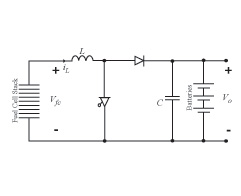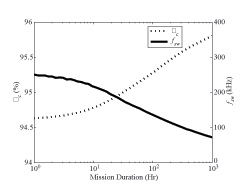Optimization of power converters in portable energy sources
Nicholas Benavides with adviser Patrick L. Chapman
Portable electronic devices have grown in number and complexity. Powering these devices with lightweight sources is a major research focus. Advanced technology energy sources such as fuel cells and combustion-based microturbines seek to supplant chemical batteries due to their theoretically high energy density. These sources typically do not have directly useful output and are most efficient when used at a constant power level. This requires complex power conversion and secondary energy storage to meet changing load demand. Our work focuses on optimizing the tradeoff between mission duration and optimal converter efficiency. A short mission time can use a light-weight, inefficient converter by adding a small amount of fuel. Conversely on a long mission, the fuel is the most significant mass in the system, and any drop in efficiency has a larger effect on the net mass. As the mission durations approach 1000 hrs, the maximum possible efficiency is desired, even if the optimum results in a heavier converter.
The effort focused on boost converters; however, the methodology can be applied to any converter topology. In an example fuel cell system, at a mission length of 100 hours, the optimized converter saved 91 g of system mass when compared to an off-the-shelf dc-dc converter.

